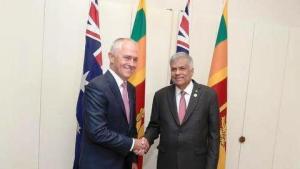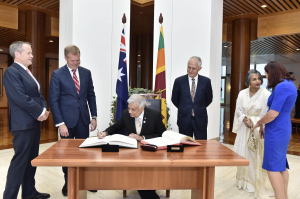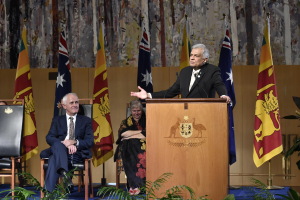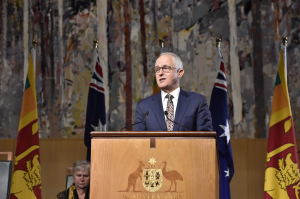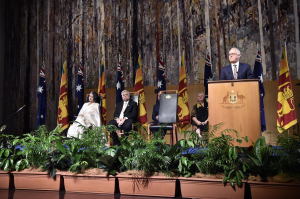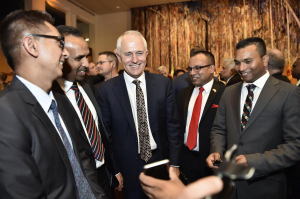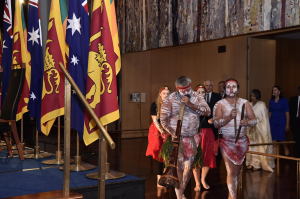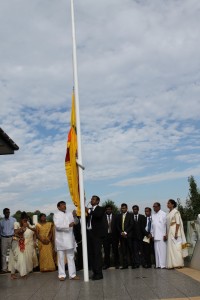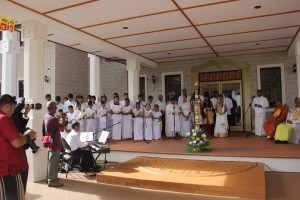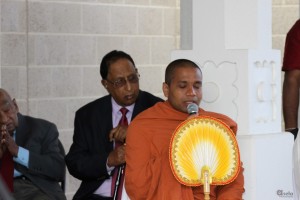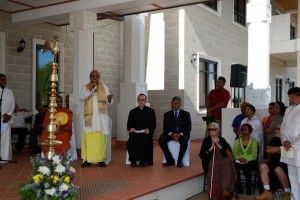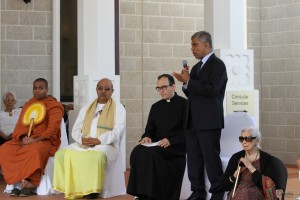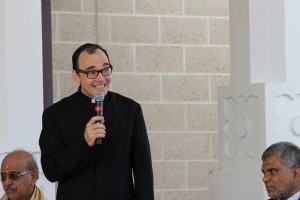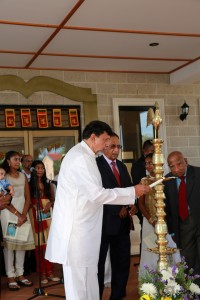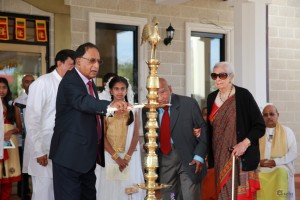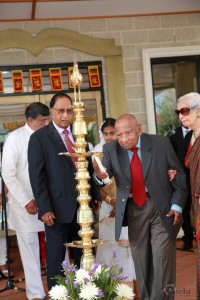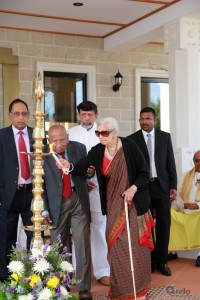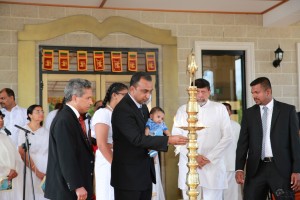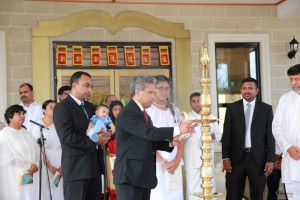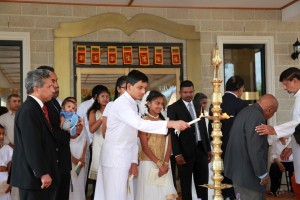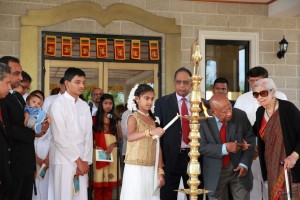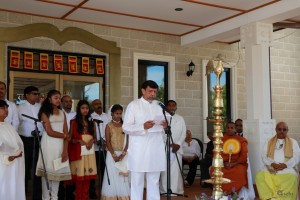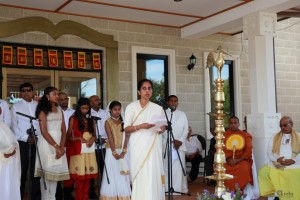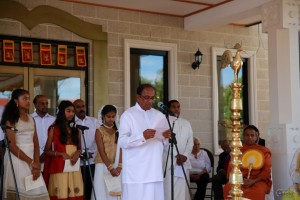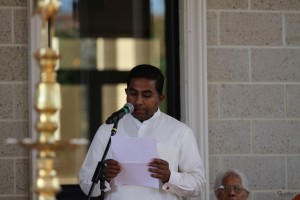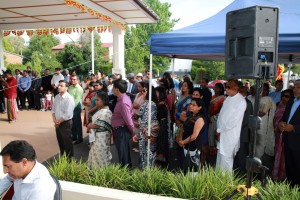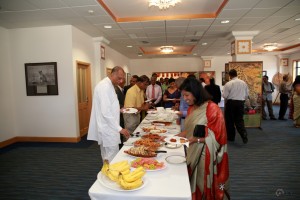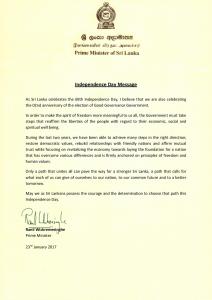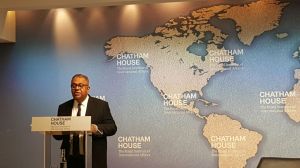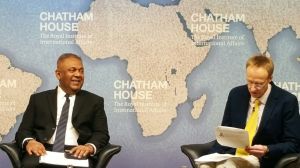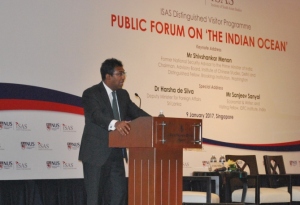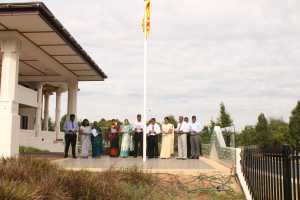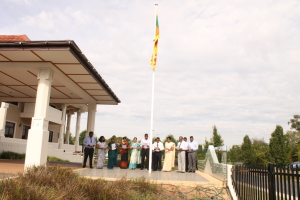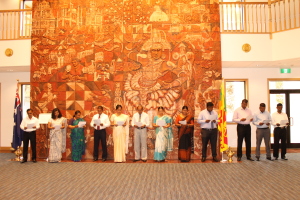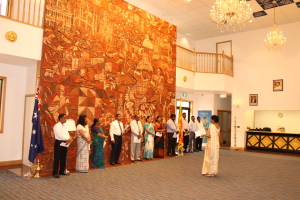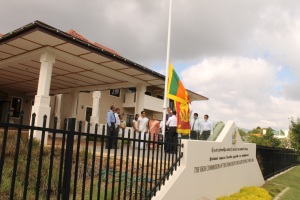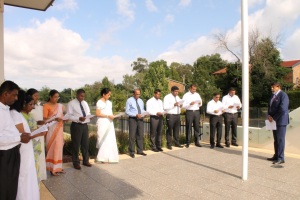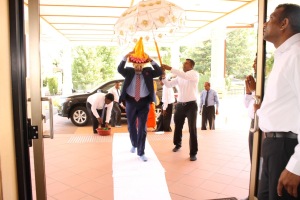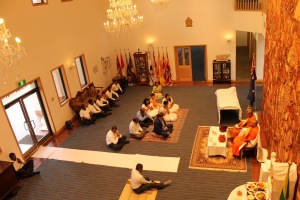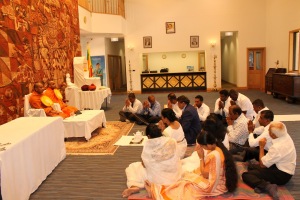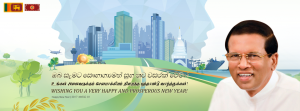


JOINT STATEMENT BY THE PRIME MINISTERS OF AUSTRALIA AND SRI LANKA
February 16, 2017
Hon. Ranil Wickremesinghe, Prime Minister of the Democratic Socialist Republic of Sri Lanka paid an official visit to Australia from 13 -17 February 2017 at the invitation of Hon. Malcolm Turnbull, Prime Minister of Australia, accompanied by Hon. Wijith Wijayamuni Zoysa, Minister of Irrigation and Water Resources Management, Hon. Arjuna Ranatunga, Minister of Ports and Shipping and Hon. (Dr). Harsha de Silva, Deputy Minister of Foreign Affairs.
Prime Minister Turnbull warmly welcomed Prime Minister Wickremesinghe on his first official visit to Australia to mark the 70th anniversary of diplomatic relations.
Prime Ministers underlined our strong historical ties, common values and shared interests – including a commitment to democracy, the rule-of-law, and support for a stable, liberal rules-based international order.
Prime Ministers commended the sustained efforts of both nations to build on these foundations to realise the benefits of closer cooperation. They welcomed strong achievements, particularly in countering people smuggling and strengthening people-to-people links. They underlined new opportunities to expand the economic relationship presented by Sri Lanka’s ambitious economic reform agenda, deeper integration with the global economy and progress toward becoming an important Indian Ocean economic hub.
Prime Minister Turnbull commended Sri Lanka on its strong economic growth and considerable progress toward national reconciliation since the end of the conflict in 2009. As a close friend and Indian Ocean neighbour, Australia will continue to stand with Sri Lanka on this journey, including through lending practical support for reconciliation measures.
Prime Ministers underlined the importance of continuing to counter the illegal people smuggling trade, which puts vulnerable peoples’ lives at risk and enriches criminal networks. They emphasised their commitment to detect and deter people smuggling ventures and to strengthen the close working relationship between agencies.
Prime Ministers reiterated our shared interest in regional stability. As Indo-Pacific neighbours, Indian Ocean Rim Association (IORA) members and trading nations, both countries benefited from a peaceful and secure maritime domain. Prime Ministers committed to closer cooperation and engagement in the Indo-Pacific to help create a more prosperous and secure region.
The Prime Ministers emphasised the significant opportunities of greater trade and economic integration in the Indo-Pacific region to both countries and their continued commitment to work together in building regional trade. In this regard, Prime Ministers noted the Kotte Statement on International Trade and Investment adopted by CHOGM 2013 in Colombo and welcomed opportunities to deepen trade and investment links.
Prime Ministers underlined opportunities to expand two-way trade and investment, particularly in agribusiness, mining, skills, tourism and energy.
Prime Ministers discussed new and growing opportunities for greater energy cooperation. They noted Sri Lanka’s changing energy requirements and that Australia was a major global energy supplier. Australian companies could play a role in securing energy supply to fuel the next stage of Sri Lanka’s economic development. They noted investment in energy infrastructure could be a major driver of economic growth in Sri Lanka in the future.
Prime Ministers noted strong and growing education ties, which boost the human capital of both countries. Many Australian education providers are active in Sri Lanka, including delivering high quality education and conducting research with local partners. Around 7,600 Sri Lankans are currently studying in Australia. Australia has sent around 300 New Colombo Plan participants to study in Sri Lanka since 2015 including in health, science, architecture, information technology, commerce and law.
Prime Ministers reiterated their commitment to ongoing defence engagement, particularly on maritime security. Strong navy-to-navy links and increasing defence student exchanges were a highlight of the bilateral relationship.
Prime Ministers agreed Australia and Sri Lanka’s longstanding development partnership had made an important contribution to Sri Lanka’s growth and prosperity during the past 70 years. Prime Minister Turnbull reiterated Australia’s strong ongoing commitment to assisting the Sri Lankan Government achieve its inclusive development goals, including through developing skills and opportunities for small business, boosting trade competitiveness and encouraging greater participation of women in the workforce. Reflecting this commitment, Prime Ministers welcomed the signing of a new MoU for a Development Cooperation Partnership.
Prime Ministers emphasised the positive role of our extensive people-to-people links, which were the foundation of our warm bilateral relationship. Australia’s large Sri Lankan community – drawn from all ethnicities – had made a significant contribution to many different sectors of Australian society and economy. They noted overseas Sri Lankans, including those based in Australia, could make a significant contribution to Sri Lanka’s future development.
Prime Ministers launched the tour of Australia by the Sri Lankan cricket team and noted the role of sporting exchanges in the bilateral relationship. They also welcomed the signing of aMoU on Cooperation in Sport to deepen cooperation between professionals in cricket, basketball, swimming, volleyball, tennis, boxing, rugby, cycling, golf and baseball, as well as in sports integrity measures.
Prime Minister Wickremesinghe thanked Prime Minister Turnbull for the warm hospitality extended to him and his delegation by the Australian Government.
Prime Minister Wickremesinghe extended an invitation to Prime Minister Turnbull to visit Sri Lanka at a mutually convenient time.
Photo Courtesy : Michael Masters/Auspic
Sri Lanka High Commission celebrates 69th anniversary of Independence in Canberra
February 6, 2017
Sri Lanka High Commission in Australia celebrated the 69th anniversary of Independence on 4th February at the High Commission premises with the participation of over 300 Sri Lankans in Canberra.
After the hoisting of the National Flag by High Commissioner Skandakumar, school children supported by adults sang the National Anthem in Sinhala and Tamil which was followed by two minutes silence to honour all those who sacrificed their lives for the Independence , sovereignty and territorial integrity of Sri Lanka.
Clergy representing the Buddhist, Hindu, Christian and Islam faiths, invoked blessings on the people of Sri Lanka.
Thereafter, the National Day Messages of President Maithripala Sirisena, Prime Minister Ranil Wickremesinghe and Foreign Minister Mangala Samaraweera were read out.
Addressing the large gathering High Commissioner Skandakumar said that the messages explicitly outlined the national unity Government’s vision for the ensuing year.He thanked the community for their participation at all events conducted by the Mission and recalled that the success of the Sri Lankan festival held at the Mission on 12th Nov 2016 was an indication of what was possible when we came together and supported each other.
He reflected on the commendable cross nation walk a few years ago from South to North that enabled a cancer hospital to be built in Tellipalai and an identical initiative by equally dedicated Srilankans of all ethnicities and religious faiths who covered over 600 kilometres in the month of October 2016, to raise funds for a similar facility in the South. These projects he said underlined the true meaning of unity and reconciliation and impacted our people deeply. The High Commissioner related an incident associated with that walk where a disabled beggar seated on the road with crutches by his side, donated his day’s collection to the project, touching the hearts of all.
All of these he said remind us that we are indeed a nation of caring and compassionate people and expressed the hope that a year from now when we celebrate our 70th year of Independence, we can each look back on the preceding twelve months and say with conviction that we did make a sincere contribution to the Government’s pledge for Peace, and reconciliation.
Sri Lanka High Commission
Canberra
4th February 2017
Independence Day Messages
February 4, 2017
Independence Day Message of the President
Many freedom struggles of humankind have aggrandized the story of human progress. We Sri Lankans too have inherited a long history of such struggles, that brings forth memories of grief and glory, from the times of our Kings to that of modern democracy. The nation is indebted to our forebears, whose selfless sacrifice of sweat and blood have brought about the freedom, in which we breathe today.
It is at a challenging and decisive moment, that we celebrate the 69th Independence anniversary this year. The responsibility of strengthening the recently secured democratic freedom, as well as ensuring that, enriched by indigenous wisdom, so that all communities could live with dignity, lies on our shoulders. We have been able to overcome a dark era and reillumine our unsurmountable aspirations for democracy, freedom, and human dignity. However, the realization of the true meaning of freedom and independence lies in our potential to free ourselves from the shackles of all kinds and forms of poverty, ill-health, and confines of divisive identities of race, religion and caste, and enrich ourselves, as a society that values equity and rights of all.
We are a nation that deserves to live a prosperous life in a country where peace and justice and equality prevail.
It is my sincere wish that we continue to prosper by vanquishing ignorance by knowledge, untruth by truth, hatred by compassion and violence by nonviolence and become a compassionate nation.
Maithripala Sirisena
President of the Democratic Socialist Republic of Sri Lanka
February 04th, 2017
Message in Sinhala Message in Tamil Message in English
Independence Day Message of the Prime Minister
Message in Sinhala Message in Tamil Message in English
Independence Day Message of the Minister of Foreign Affairs
On the sixty-ninth anniversary of Sri Lanka’s Independence, I extend warm greetings to all Sri Lankans and persons of Sri Lankan origin who live and work across the world in different capacities.
Our Nation’s journey since the 4th of February 1948 has been mixed with achievements that we can be proud of, as well as challenges fraught with pain and anguish.
Following the decisive step taken under the leadership of President Maithripala Sirisena and Prime Minister Ranil Wickremesinghe, to form a National Unity Government, we proceed on the path of formulating national policies required to ensure our nation’s progress as a strong democracy, where good governance, the rule of law, individual rights, justice, freedom, and the dignity of all are upheld; the multi-ethnic, multi-cultural, and multi-religious nature of our country is cherished and celebrated; where all forms of discrimination are denounced; and we build a strong nation with equitable economic development, that would be at peace with itself and with the world, working together with the international community for the benefit of all.
The path we have chosen for ourselves is a challenging one. The task of nation-building is one that requires dedication and commitment of all Sri Lankans living both in Sri Lanka and overseas.
As we approach the seventieth year of our Independence, I urge all of you to seize this historic moment in our nation’s history to contribute your strengths, your goodwill, your energy, skills and wisdom, to build an inclusive and prosperous nation that is reconciled and at peace so that we march forward as the brothers and sisters of one family, with respect towards all, to ensure the non-recurrence of conflict and build the Sri Lanka of our dreams as proud citizens.
Mangala Samaraweera, MP
Minister of Foreign Affairs
Regional Consular Office of Foreign Ministry to be opened in Jaffna
January 25, 2017
Following the vision of President Maithripala Sirisena and Prime Minister Ranil Wickremesinghe, of enhancing the efficiency and effectiveness of service delivery to the public, the Ministry of Foreign Affairs will open a Regional Consular Office in Jaffna on Thursday 26 January 2017 at 10.30 a.m.
The Consular Office which will be located at the District Secretariat in Jaffna, will be declared open with the participation of Foreign Minister Mangala Samaraweera, Leader of the Opposition R. Sampanthan, the Governor of the Northern Province Reginald Cooray, Chief Minister of the Northern Province, C.V. Wigneswaran, Minister of Prison Reforms, Rehabilitation, Resettlement and Hindu Religious Affairs D. Swaminathan, Minister of Industry and Commerce Rishad Bathiudeen, and State Minister of Women & Child Affairs Vijayakala Maheshwaran.
The Regional Office will provide a range of consular services to the public that were previously provided only through the Office at the Ministry of Foreign Affairs in Colombo. Services provided by the Regional Office will range from attestation of birth, marriage and death certificates as well as educational certificates for their use abroad; extending assistance to family members of Sri Lankans who may be stranded abroad; facilitation of redress and compensation claims of families of migrant workers; and repatriation of human remains from abroad.
Regional Consular Office of the Ministry of Foreign Affairs
District Secretariat, Kandy Road, Jaffna
Operating Hours : Monday to Friday: 8:30a.m. to 4:15 p.m.
Telephone : 00 94 21 2215970
Fax : 00 94 21 2215972
Email : Jaffna.consular@mfa.gov.lk
Ministry of Foreign Affairs
Colombo
24 January 2017
Australia lowers the Sri Lankan Travel Advisory to reflect improved security environment
January 16, 2017
Australia has lowered the Sri Lanka Travel Advisory from the previous Level 2, to Level 1, which advises travellers to “Exercise normal safety precautions”.
The official Smartraveller website states that “The level of the advice has decreased to ‘exercise normal safety precautions to reflect the improvements in the security environment in Sri Lanka.”
The updated Travel Advisory can be viewed at http://smartraveller.gov.au/Countries/asia/south/Pages/sri_lanka.aspx
“The Reconciliation Process in Sri Lanka” Remarks by Foreign Minister Mangala Samaraweera at the Royal Institute of International Affairs, London
January 14, 2017
Remarks
by
Hon. Mangala Samaraweera, MP
Minister of Foreign Affairs of Sri Lanka
The Royal Institute of International Affairs, London
Wednesday 11 January 2017
The Reconciliation Process in Sri Lanka
Mr. Chairman, Professor Jonathan Goodhand,
High Commissioner for Sri Lanka, Mrs. Amari Wijewardena,
Distinguished Invitees,
Ladies and Gentlemen,
Friends,
It is indeed an honour to speak at the historic Chatham House today, as one of the first speakers in the New Year. May I also take this opportunity to congratulate all of you at the Royal Institute of International Affairs for being chosen as the, “Think tank of the year by Prospect Magazine” which commended your work as “Reliably excellent” and a “Gold Standard of knowledge and professionalism”.
The topic on which I speak today – ‘The Reconciliation Process in Sri Lanka’, in fact holds special significance for us Sri Lankans this week. This is because, the Cabinet of Ministers recently declared this week, from January 8th to the 14th, as the ‘National Integration and Reconciliation Week’. This coincides with the completion of two years since the historic Presidential election of January 8th 2015, and this is the first occasion on which this annual National Integration and Reconciliation Week is being observed in my country.
As one of the main features of this Observance, on 9th January, in schools and state institutions including in Parliament, a Pledge for National Integration and Reconciliation was read out,
-resolving to work together, hand in hand, while respecting the richness of our diversity, to foster peace, understanding, mutual trust, and brotherhood; a new Sri Lanka united in it’s diversity.
Ladies and Gentlemen,
Several of my predecessors too have spoken here at the Chatham House. This includes the late Mr. Lakshman Kadirgamar who spoke at length here, in 1998, about the danger faced by our nation at the time, and democratic societies everywhere, from terrorism.
Almost twenty years later, I feel fortunate to be here representing a country where the guns and the bombs have finally fallen silent.
Although the violence ended in May 2009, the healing of wounds of over two decades of conflict, achieving reconciliation and national integration, catching up on economic progress and development that eluded us due to conflict, and ensuring non-recurrence, remain challenging tasks for our Nation. Similarly, the tasks of improving governance, institutions, rule of law, and putting in place necessary measures to strengthen, promote and protect individual rights; while ensuring the dignity of all and building a truly national identity while preserving our pluralistic society – remain work in progress.
Ladies and Gentlemen,
This week, 2 years ago on the 8th of January, the people of Sri Lanka courageously turned out to vote across the country to end authoritarianism, corruption and the politics of hate; they voted for a new democratic Sri Lanka where democracy, reconciliation, the rule of law and sustainable development would flourish.
This courageous decision by the people of Sri Lanka enabled us, for the first time in our country’s history, to form a Government of National Unity, bringing together, the two main political parties – the Sri Lanka Freedom Party headed by President Maithripala Sirisena, and the United National Party headed by Prime Minister Ranil Wickremesinghe.
Having achieved a significant number of promises set out in the 100 Day Work Programme of the Government, the most significant being the repeal of the 18th Amendment to the Constitution, and the adoption of the 19th Amendment, fresh Parliamentary elections were called in August 2015.
The 19th Amendment, as most of you I am sure are aware,
– Re-introduced the two-term limit of the Presidency,
– Reduced the term of the Presidency from 6 to 5 years,
– Established a Constitutional Council,
– Restored Independent Commissions,
– Recognised the Right to Information as a fundamental right, and
– Recognised the Promotion of National Reconciliation and Integration as duties of the President.
The Government also had in its hands, the task of restoring Sri Lanka’s relations with the outside world, and restoring lost credibility.
The Government, since January 2015, therefore, started reaching out to the international community, re-engaging with governments and international organisations.
The power of Parliament has been strengthened. Oversight Committees have been set up with Opposition members chairing several key Committees.
The Right to Information Act, which was enacted by Parliament last year and is now in the process of being operationalized.
Ladies and Gentlemen,
In two years Sri Lanka has made considerable strides from soft-authoritarianism towards consolidating a rights-based democracy with deeply entrenched institutions and values.
We are convinced and we recognize clearly, that societies that avoid looking at the past, fail to build sustainable peace. Sri Lanka has suffered conflict several times both in the South and in the North. There is hardly anyone in Sri Lanka who can claim to have not been affected by conflict. We know that traumatic memories don’t simply vanish and we have learned, through experience since Independence that grievances that are left unaddressed, can go on for generations, becoming entrenched, and holding the risk of descending into cycles of violence.
It is these realizations that cry out to us that our nation will never be able to achieve the full socio-economic development potential that our nation can reach, and our citizens are so deserving of, if we fail to address grievances, that risk plunging our nation into conflict once again, that led us to co-sponsor the Resolution that we worked on with members of the Human Rights Council in October 2015. The content of the Resolution is based on commitments that we ourselves as a Government, made to our people, and proposals that we presented to the Council based on the Lessons Learnt and Reconciliation Commission Report, the Paranagama Commission Report and advice of our experts.
As the President said in his Independence Day speech in February last year, Sri Lanka is committed to the implementation of that resolution so that we as a country can deal with the past honestly and truthfully, accept that past, put it behind us, and then move forward to build our Sri Lankan nation anew.
The set of actions that the Government has identified to deal with the past in a comprehensive manner, addressing the grievances of all victims, include truth seeking, justice, reparation and measures for guaranteeing non-recurrence. As a first step, we have enacted legislation to set up an Office on Missing Persons. Now that the Consultation Task Force set up to seek the views of the public has just handed over its Report to the Government on the 3rd of January, the relevant experts of Government, in an exercise coordinated by the Secretariat that has been set up to Coordinate the Reconciliation Mechanisms will be studying the Report and finalizing the designing of a Truth-Seeking Commission and a Reparations Office.
As some of you may be aware there are divergent views even within the government in respect of the participation of foreign judges in the proposed judicial mechanism.
However, despite this divergence of opinions, there is a clear consensus across the board on the need of an independent and credible domestic mechanism as promised by the manifesto of President Maithripala Sirisena. As a democratic and sovereign government, we will work out the architecture of such a mechanism in consultation with all the stake holders.
Among the various multiple tasks, we have undertaken include the drafting through a consultative and inclusive process, of a National Human Rights Action Plan for the next five years beginning from this year (2017-2021).This draft Action Plan is currently before Cabinet.
As you are aware, Missing Persons is a phenomenon that has plagued Sri Lanka for long years. Apart from steps being taken to set up the permanent Office on Missing Persons, we have also become parties to the International Convention for the Protection of All Persons from Enforced Disappearance. The draft enabling legislation to give effect to the provisions of the Convention is also presently before the Cabinet.
Ladies and Gentlemen,
As you are aware, one of the first steps taken by the National Unity Government in January 2015 itself was to restore civilian administration in the North and the East of the country. We have also taken a series of symbolic steps to establish equality of all citizens, such as singing the National Anthem in both Sinhala and Tamil; promising the people to ensure that we don’t allow our country to plunge into conflict and the shedding of blood of our citizens by adopting a Declaration of Peace on Independence Day in February 2015; and observing the National Integration and Reconciliation Week annually, beginning from this week.
As an important measure to prevent non-recurrence of conflict, the Parliament, last year, unanimously adopted a Resolution for the Parliament to sit as a Constitutional Assembly to draft a new Constitution that would, among other provisions.
Much of the preparatory work for the new constitution has now been completed. Wide-ranging public consultations were conducted for the first time in Sri Lanka’s constitutional history; much study, reflection and negotiation was undertaken to arrive at consensus at the six sub-committees set up and final negotiations on a draft are currently underway.
Right now, the President’s party, the SLFP, and the JVP have asked for time to present their respective final proposals. The Interim Report therefore is expected to be tabled in the Constitutional Assembly in early February, for debate.
On the developmental front, a solid foundation for economic growth, job creation and broad-based prosperity is being laid. First, the government is dealing with the white elephant economy it inherited: debt, fiscal pressures and wasteful expenditure were serious problems that have now been stabilized.
The Government’s plans of making Sri Lanka an Indian Ocean hub are beginning to bear fruit: the Colombo International Financial City; the Hambantota, Colombo East and Trincomalee Ports; and the Katunayake and Palali Airports are all hives of activity. By 2020, Sri Lanka will have the necessary infrastructure, regulations, and companies in place to achieve its hub ambitions.
Ladies and Gentlemen,
Sri Lanka has been at the cusp of breakthroughs many times before. There were much expectations from Sri Lanka at the time we gained Independence. Since then, we have been permanently at a make-it or break-it cross-roads for decades. Peace and prosperity have always been in sight and within grasp; but these many moments when history was pregnant with opportunity ended in disappointment.
But this time, there is reason to hope. The violence has finally ceased. The two main parties that have always worked against each other have now come together. The President, Prime Minister and the Leader of the Opposition are people with wisdom who know that what we have today in Sri Lanka is a unique opportunity which we simply cannot afford to miss. It is not the opportunity of the decade but the opportunity of our life-times. For the first time in Sri Lanka’s history the UNP, SLFP, TNA and Muslim parties have agreed to work together to address the root causes of conflict. We have learnt from the mistakes of the past, and we are committed to ensuring that we achieve the promise that shined so brightly at our Independence.
Our history tells us that Sri Lanka was the marvel of the ancient world when she embraced multiculturalism, openness and trade. Anuradhapura and Polonnaruwa, at their heights, were home to people of all races and creeds. A spirit of celebrating diversity prevailed, and our civilization was enriched with ideas and practices from Rome, Persia, Egypt, Greece, India, South East Asia and China. We were a connected civilization proud of our position at the centre of Indian Ocean trade.
The lessons and the choices of our history are clear to us today. We have a choice between impunity, conflict, corruption, extremism and poverty, or the rule of law, accountability, equality, multiculturalism, openness and trade. We have a choice between conflict and poverty, versus peace and prosperity.
The statement issued in Brussels earlier today by the European Commission on granting the GSP+ concession to Sri Lanka is yet another indicator of Sri Lanka moving along the right track.
Two years since the 8th of January in 2015, the National Unity Government remains steadfast in its determination to achieve the objectives it set out to achieve for our country. We have succeeded against far greater odds and more powerful foes. The challenges that we have before us are not easy ones. But determination and unity, and courage and moral fortitude drives us to embrace tough choices and endure hardship to break the cycle of missed opportunities and disappointments to achieve for our people, especially our future generations, the prosperous and peaceful land that they so deserve. We are determined to ensure our success.
That is why I say to the cynics again that there will be no U-Turn despite some detours from time to time.
Breaking from the past, we will confine those who spin webs from the threads of ignorance to the dust-bin of history; finally put prejudice, ignorance, mediocrity and opportunism behind us once and for all, and build a truly united, democratic, multi-cultural and prosperous Sri Lanka where peace, justice, equality, dignity and freedom for all, prevail.
FESTINA LENTE; slowly but surely Sri Lanka is making haste towards a new beginning.
“Sri Lanka’s Role in the Indian Ocean and the Changing Global Dynamic” Speech by Dep. Foreign Minister Dr. Harsha de Silva at the Institute of South Asian Studies
January 14, 2017
“Sri Lanka’s Role in the Indian Ocean and the Changing Global Dynamic”
Speech by Dr Harsha de Silva, Deputy Minister for Foreign Affairs, at the Public Forum organized by the Institute of South Asian Studies, National University of Singapore, 9th January 2017
Ambassador Gopinath Pillai, Mr Shivshankar Menon, Mr Sanjeev Sanyal distinguished ladies and gentlemen, good afternoon.
Let me first thank Ambassador Pillai for inviting me to the Institute for South Asian Studies here at the National University of Singapore for this public forum on The Indian Ocean.
It is an honor for me to be here this afternoon and participate in this discussion. I bring greetings from the people of Sri Lanka.
Today marks the 2nd anniversary of an important turning point in Sri Lanka’s recent history. It is the beginning of the 3rd of the 5 year term of President Maithripala Sirisena. On 8th January 2015, the people of Sri Lanka went to the polls and on the 9thswitched from a government which had embarked on a divisive and authoritarian trajectory to one of convergence and National Unity.
For the first time since Independence, traditional rivals in Sri Lankan politics, eschewed adversarial politics to undertake pressing political and economic reforms in the long-term interests of the people. Sri Lankans demonstrated to the world that they could change a well-entrenched government, long considered to be undefeatable, by using a simple tool called the ballot.
It was an unexpected outcome to many, both outside and inside of Sri Lanka and demonstrated the importance of democracy.
Optimism in a changing global dynamic
During the last 2 years, we have achieved some notable successes as well as faced some complex challenges that have slowed down our progress. It is a trajectory that is inevitable in a democracy.
Sri Lankans are a resilient people who sustained a sense of optimism about the potential of their country even in the darkest moments of our history. Now, perhaps for the first time in our contemporary history, the future holds more promise than doubts.
We believe that we are at a stage of economic growth and political maturity, which combined with opportunities presented by global and regional developments, will allow us to propel ourselves to the next phase of development if we play our cards right.
Therefore, it’s with a sense of optimism that I approach this topic of my speech ‘Sri Lanka’s Role in the Indian Ocean and the Changing Global Dynamic’.
The moment one hears the two words Sri Lanka his or her mind travels to South Asia. And that is why we are here at the ISAS. However, for centuries Taprobane, Ceylon, Sri Lanka or whatever the island was referred to was the heart of the Indian Ocean.
So, we would like to position Sri Lanka more as that centre of the Indian Ocean.
The future prosperity of our people lies in how well we leverage our location in the Indian Ocean.
In order to accomplish our goals we must be vigilant on regional and global developments that will aid or hinder our path.
The year 2016 was a tumultuous year in politics and economics.
We are witnessing momentous changes in the structure of the global economy brought about by the relentless winds of globalization and the current manifestation of Western neo-liberalism.
It is reasonable to be concerned at the rapid pace of changes, and what it means for our economies.
The effect of Brexit and (and other possible exits from the EU) and the trade policies of the US-President-Elect will take some months, even years, to manifest.
And many will be observing with interest the interactions between China and the incoming US Administration.
It is in this context that many say that “Uncertainty is the new normal in business life”. Those countries and organizations which thrive in an era of uncertainty will be those who seize the opportunities presented by these uncertainties and take actions that can avert disasters and promote confidence and recovery.
So the emerging and uncertain global dynamics will present both challenges and opportunities to us in the Indian Ocean.
Sri Lanka’s historical role in the Indian Ocean
Our location has shaped our history so intrinsically for millennia and will continue to be so in the future.
In ancient times, Sri Lanka was important as the half way point between the two great empires of Rome and China and near the equator where navigational winds and monsoon effects changed directions. Therefore, it had strategic geographical advantages where global and navigational contexts were concerned.
The island featured prominently in the Spice Routes which were also known as Maritime Silk Roads. In fact, it is said that cinnamon from Sri Lanka and cassia from China found their way along the Spice Routes to the Middle East as far back as 2,000 BC.
Foreign merchants were attracted to ancient Taprobana because of its importance as a centre of international trade and some of them even settled in the island, particularly Moors, descendants of Arab traders to the island.
They were a dominant influence on the island’s international trade in the Polonnaruwa period in the 11th to 13th centuries; a position which they retained till the early decades of the sixteenth century.
An examination of the foreign relations of the island under the Polonnaruwa kings reveals political links with South-East Asia, in particular with Myanmar and Cambodia.
Peace and prosperity along the maritime Silk Road helped increase the volume of trade via the Indian Ocean, from which Sri Lanka naturally profited.
Much of this trade was in luxury goods, and in this respect, Sri Lanka was a transit point as well as a terminal point, the latter due to Sri Lanka’s own considerable luxury products such as gems and pearls.
However, ancient Sri Lanka was largely a self-sufficient agrarian economy and role of trade was a generally peripheral activity.
It was only after the collapse of the ancient hydraulic civilization at the end of the Polonnaruwa period that the country’s rulers began to pay greater attention to the economic possibilities of trade.
Exports of spices, particularly cinnamon, became an increasingly lucrative activity. During the period 13th-15th centuries, Sri Lanka’s position as a trade hub on the East-West maritime route had been established, as had its position as a gateway to India.
Sri Lanka had direct commercial links with Malacca, and also with regions in India such as Gujarat and Bengal.
During the colonial rule by the Portuguese, Dutch and lastly the English, the volume of foreign trade expanded. The tea trade which was started by the British still plays a significant role in the Sri Lankan economy.
However, in the last 500 years the Indian Ocean region lost its geo political and geo economic relevance; first to colonial dictates and in thereafter post-colonial cold war concerns.
Sri Lanka’s strategic role in the Indian Ocean
Now, for the first time in five centuries, global economic balance of power is once again shifting towards Asia. It is estimated that by 2030, Asia will surpass North America and Europe combined in global power based on GDP, population size, military spending and technological investments.
The global financial system is also moving away, albeit slowly, from the dollar dominated international system to a more multi-currency system.
New consumer markets are emerging all across Asia and the Asian middle class is expanding rapidly. Of the four largest economies of the world; US, China, Japan and India, three are located in Asia.
The busy East-West shipping route passes just six to ten nautical miles south of the island with more than 60,000 ships plying this route annually carrying two-thirds of global petroleum supply and half of all containerized cargo.
Thus, Sri Lanka’s situation in the nautical corridor between the East and West is of importance not only from a geostrategic perspective, but also from maritime economics and security perspectives.
We are under no illusion that as a small country, we can change the geo-political realities of the region surrounding us. Thus, a wise foreign policy is essential, not only for the present but to ensure the prosperity and safety of future generations.
Along with many opportunities, the renewed interest will also bring vulnerability to emerging competition among major naval powers.
The blue-water naval capabilities of key Asian States have ushered a new strategic environment, and the Indian Ocean has become an extremely important geo-strategic space.
While the maritime space of Asia is strongly connected to the Indian and the Pacific Ocean through trade and commerce routes, there is a difference in the power dynamics of the Pacific and the Indian oceans.
The power play in the Pacific is dominated by its proximity to the US, centrality to US security policies, and now the rise of Chinese naval power. In contrast, the Indian Ocean Region has maintained a multipolar characteristic.
Let us take a step back and consider when the change started. This transition in global power to Asia began with the economic awakening of East Asia, driven by the growth of China.
And the complementary growth of ASEAN countries; particularly Indonesia and Vietnam.
While the South Asian region has not matched the same level of development, the region is acquiring an intrinsic significance of its own underpinned by the growth of India.
Currently India is the fastest growing large economy in the world and the power transition in the Indian Ocean will be heavily influenced by South Asian developments.
The Indian Ocean plays a crucial role in the future of both these major powers.
The sea routes through the Indian Ocean are very important to China’s maritime trade and energy supply. Therefore, both countries will have to respect each other’s legitimate interests to ensure that their future prospects are not affected in the long term.
Unlike the Asia Pacific, the Indian Ocean region is not economically integrated.
No single power or a coalition will be able to maintain peace and stability on their own in the Indian Ocean. In capacity terms also, no country is capable of handling the maritime security threats and challenges in isolation, no matter how advanced and developed it might be.
In addition, it is preferable that the region continues its historical multi-polar characteristic and prevent a spillover of tension from other regions.
In such a background, all maritime nations have a role to play in ensuring the overall balance of strategic weight. Smaller nations such as Sri Lanka, even with comparatively limited maritime resources can become an integral element of maritime security in the region.
It is our view that the Indian Ocean is in need of a mutually benefiting security architecture established on a multilateral basis.
There is also space for an effective multilateral governing structure. In this regard, I may add that the Prime Minister of Sri Lanka has expressed an interest in crafting an Indian Ocean Order with accepted rules and agreements that would guide interactions between states. Speaking here in Singapore last year at the inauguration of the Indian Ocean Conference Mr. Ranil Wickremesinghe called for this Order to be built on a consensual agreement and that no singular State should be allowed to dominate the system.
The Indian Ocean Order would have the primary responsibility of upholding the freedom of navigation in the Indian Ocean, ensuring that shipping and air routes to East Asia and beyond are kept open, building closer economic cooperation amongst countries in the region.
In this regard, my Prime Minister called for a dialogue between SAARC and ASEAN leaders. Perhaps that can happen sooner than later and we would be delighted to play a role.
Be that as it may, Sri Lanka remains committed to preventing international terrorism, transnational crimes and people smuggling in the seas around our country. Supplementing the blue water capability of the Sri Lanka Navy and the consolidation of the Sri Lanka Coast Guard are areas of concern for our Government.
We are also reviewing the possibilities of integrating the capabilities of the Navy and the Air Force.
Repositioning Sri Lanka
The Government of Sri Lanka has a clear vision of what it wants Sri Lanka to be in the world today.
We are repositioning Sri Lanka to maximise our relationships with both our historic and new trading partners to leverage our geo-strategic position to make us a hub of the Indian Ocean as well as a transshipment port for the Bay of Bengal trade.
To fully tap this potential, Sri Lanka is engaging in initiatives with regional players who have major economic stakes in the Indian Ocean.
Sri Lanka is now pushing towards further integrating with the world by undertaking reforms to facilitate trade, and encourage productive foreign investment.
We have set a target of boosting exports to US$ 20 billion by 2020; an increase in exports of nearly 80% during 2016-2020.
It is unfortunate that in the last decade or so the previous government in Sri Lanka lost its focus on exports. Exports to GDP fell from 34% of GDP to less than 14%. So, it is critical that we implement our plans to leverage on our competitive advantages as now planned.
Unlike ASEAN which provides its members with a largely stable and peaceful regional environment to focus on economic development at formative stages of their countries’ development, SAARC has not been able to achieve the same level of regional integration.
These geo-political realities require that Sri Lanka build strong bilateral relations with Bay of Bengal members of ASEAN in addition to its fellow South Asian members. In addition, we cannot be content with our traditional markets, and we must look beyond for new opportunities.
India and Sri Lanka hope to finalize an Economic Technology Cooperation Agreement (ETCA) by 2017. The ETCA will enhance the scope of our existing Indian Sri Lanka FTA to extend freer movement of goods and services with the added emphasis of cooperation in the development of technology and in investments.
ETCA will provide an impetus to the existing synergies and has the potential to promote rapid growth of the sub regional economy between Sri Lanka and the five South Indian states, that is Tamil Nadu, Kerala, Karnataka, Andra and Telengana which today accounts for and economy of 500 billion dollars.
We are also negotiating a FTA with Singapore. Singapore already has a Comprehensive Economic Partnership Agreement (CEPA) with India. Therefore, we believe that by next year the Singapore-India (CEPA), the Indo-Lanka ETCA and the Sri Lanka-Singapore FTA will enable the southern sub region of South Asia and Singapore to establish a tripartite arrangement for trade and investments.
Sri Lanka is supporting the One Belt – One Road economic initiative, in line with the major historical role we played in the Maritime Silk Route. This will consolidate our position to become the Hub of the Indian Ocean while further integrating us with the Asian markets.
Chinese investments will be primarily directed to industrialization and further development of the Hambantota Air Sea Hub in southern Sri Lanka.
In addition a 1.4b dollar reclamation is now underway adjacent to the city of Colombofor the creation of a 560 acre Financial City, under English law, to fill the vacuum for offshore financial service between Singapore and Dubai.
Chinese investors have made significant commitments to invest equity in the China-debt strapped Hambantota port and the Mattala international airport the previous Government built; now as PPP ventures.
Our government is currently negotiating a 1.3 billion USD lease agreement with CMPort of China to lease the currently empty deep sea port to integrate with the proposed industrial zone.
It was just this Saturday we inaugurated the 15,000 acre, that is 50 square kilometer ‘Sri Lanka China Logistics and Industrial Zone’ to become a seriousplayer in global production networks.
It was revealed at the inauguration that Chinese investors were ready to bring in 5 billion USD in investments in to the zone in just the next 3 years.
The economic cooperation with Japan is as important to us. We are grateful that four decades of Japanese donor assistance has made a significant impact on our economic and social developments in Sri Lanka.
The Japanese Prime Minister has also appointed a senior official to especially coordinate Japanese Sri Lanka Joint Comprehensive Partnership Programme that was entered in to last year.
After some lull, Japan is once again also getting involved in several major infrastructure projects in Sri Lanka including Light Rail and expressways.
Many may not be aware that Sri Lanka also is home to the second largest natural harbor in the world in Trincomalee; said to be one of the finest deep sea harbors in the world.
In fact, there have been many sea battles to control the harbour. The Portuguese, Dutch and the English have each held it in turn. In 1942 the Japanese Imperial Navy attacked Trinco harbor and sunk three British warship anchored there.
While it has a large 99-unit tank farm built by the British during the war and mostly unused, except for some tanks by the Lanka Indian Oil Company, we have now initiated action to develop the port cenetred the larger Trinco development zone.
The government is working with India and Japan to develop Trincomalee with Surbana Jurong of Singapore already being contracted to draw up a city master plan.
The proposed container terminal at the Trincomalee Port will serve trade in India’s east coast as well as Bangladesh and Myanmar.
With the strong interest in utilizing the zones along the Southwest Corridor centered around the Colombo port and the Western Megapolis; logistics and industrial zone centered around the Hambantota air-sea hub and the North East corridor centered around the Trincomlee port development by investors from China, Korea, and Japan and also likely from India, we plan to create an export market focused on Europe, China, Japan and USA and the crescent of markets around the Indian Ocean.
Among the Middle East, Iran, Afghanistan, Pakistan, India, Bangladesh, Myanmar, Thailand, Malaysia, Singapore and Indonesia there exists a fast-growing population currently of over 2 billion people. This combined market has the potential of 3 billion consumers by 2050.
Going forward, our development strategy will be aimed at capturing trading opportunities within these identified Indian Ocean markets by pursuing trade liberalisation agreements with their governments.
We have already made the application to the European Union to regain the GSP+ facility for preferential access to the single market and are hopeful of an agreement by next year. European Commission has expressed their confidence that the GSP Plus trade concession would be given favourable consideration.
A concerted effort is also underway to improve the business climate domestically. Far-reaching governance reforms that are rules based have made investment and business more secure and certain.
Sri Lanka is taking measures to increase investor’s ease of doing business more directly. For example, we are bringing a number of government agencies together to create a one-stop investment and trade-facilitation shop under the Agency for Development.
We are reviewing our laws and regulations to create a simple rules-based business environment: including those related to land ownership, as well as tariffs and para-tariffs. We have adopted policies that enable private enterprise to thrive: for example, Sri Lanka has a simple 3 tier tax rate with the lowest at 14 percent. Together these reforms – alongside our educated workforce and solid infrastructure – are making Sri Lanka the most attractive, secure and competitive investment destination in the region.
Conclusion
In conclusion, I would like to point out that those of us who are geographically located in the Indian Ocean region have a primary interest in the security of the Indian Ocean, which is directly linked to our economies.
Therefore, managing competition and strengthening cooperation would be essential given both these economic and strategic security factors which have a direct impact on the future of this region. There will always be tension, such as between large countries and their smaller neighbors.
However, the countries in the Indian Ocean region have more in common in terms of history, culture and religion, than what sets us apart.
We believe that the Indian Ocean Region now facing an extraordinary opportunity to create something new in the global context and something historically uniquely beneficial to its people. Thank you.
National Integration and Reconciliation Week – 8 – 14 January 2017
January 9, 2017
The Sri Lanka High Commission in Australia commemorated the National Integration and Reconciliation Week on Monday 9th January at the High Commission in Canberra.
The commemoration started with the hoisting of the National Flag followed by the singing of the National Anthem in Sinhala and Tamil. Thereafter the Oath of National Integration and Reconciliation was affirmed by the staff in all three languages.
Acting High Commissioner Himalee Arunatilaka briefly outlined the importance and the need of national integration and reconciliation in the country, in order to achieve social and economic advancement in the post conflict environment. She said diversity is the strength in a multi-cultural society like Sri Lanka, and we need to build a “Sri Lankan” identity if we are to develop as a country. Sri Lankans living overseas play an important and essential role in national reconciliation; that is why the High Commission attaches such importance to promoting unity and reconciliation among the Sri Lankan diaspora community in Australia.
Sri Lanka High Commission
Canberra
9 January 2017
Click here – Pledge for National Integration & Reconciliation in Sinhala, Tamil, English.
Commencement of Work in 2017 by the Sri Lanka High Commission in Canberra
January 3, 2017
The High Commission commenced work on the first working day of 2017 on 2nd January, by hoisting of the National Flag, singing the National Anthem and affirming the Oath of the Public Servants by all staff. A two minutes’ silence was observed to commemorate members of the armed forces and all others who sacrificed their lives on behalf of the motherland.
Thereafter the High Commissioner made brief remarks on the importance of serving the public with honesty, integrity and commitment at all times. The High Commissioner underlined the need for all staff to remember at all times, that they are public servants paid by the people of Sri Lanka. They must therefore contribute towards meeting the Government’s goals and policies in developing Sri Lanka as one country, under one flag, with unity and harmony, while working towards alleviate poverty in 2017.
The High Commission staff, together with the two Buddhist Associations in Canberra also offered mid day alms to the Venerable resident monks of the Sri Lanka Buddhist Vihara in Canberra. The main purpose of the alms giving was to thank the two priests, the Ven. Moragollagama Rahula Panditha Thero and Ven. Veragoda Sujatha Panditha Thero, before their return to Sri Lanka in early 2017, for their services to the community in fostering unity and harmony and promoting reconciliation. The Ven. Theros also invoked blessings on; the High Commissioner and the staff to continue their close cooperation with the Sri Lankan community; the Government of Sri Lanka which has now been in office for 2 years to give it strength in bringing peace and development to the country; and on all people of Sri Lanka for a peaceful and prosperous year in 2017.
Sri Lanka High Commission in Canberra
3rd January 2017
New Year Message from His Excellency Maithripala Sirisena , President of Sri Lanka
January 1, 2017
The year 2017 dawns with new hopes of prosperity, coexistence and reconciliation in our hearts. The twenty two million people of Sri Lanka look forward to an era of sustainability with a determination to alleviate poverty in all its forms.
It is imperative that we overcome the challenges ahead of us. The progress of the human race was pioneered by people who faced challenges with confidence, utmost courage and determination amidst obstacles. Our goals could be achieved if we manage our work efficiently and productively, and do the right thing at the right time with unwavering commitment to serve the greater good.
The adverse effects of climate change show us the imperative need to be prepared for weather uncertainties. We have to be determined this year to live with nature and not above or against it.
I wish all of you a prosperous new year in which the fruits of progress are distributed fairly and the aspirations of the people are fulfilled.
Maithripala Sirisena
President
Register with the High Commission
The Sri Lankan High Commission in Canberra would like to keep in touch with Sri Lankans and persons of Sri Lankan origin living in Australia, New Zealand, Fiji, Papua New Guinea, Vanuatu and other Pacific Islands as well as Sri Lankan community organisations in those countries.
If you are a current/former Sri Lankan or an office bearer of a Sri Lankan community organisation we invite you to register with the High Commission.
RegisterAddress
Sri Lanka High Commission
61, Hampton Circuit
Yarralumla
ACT 2600

